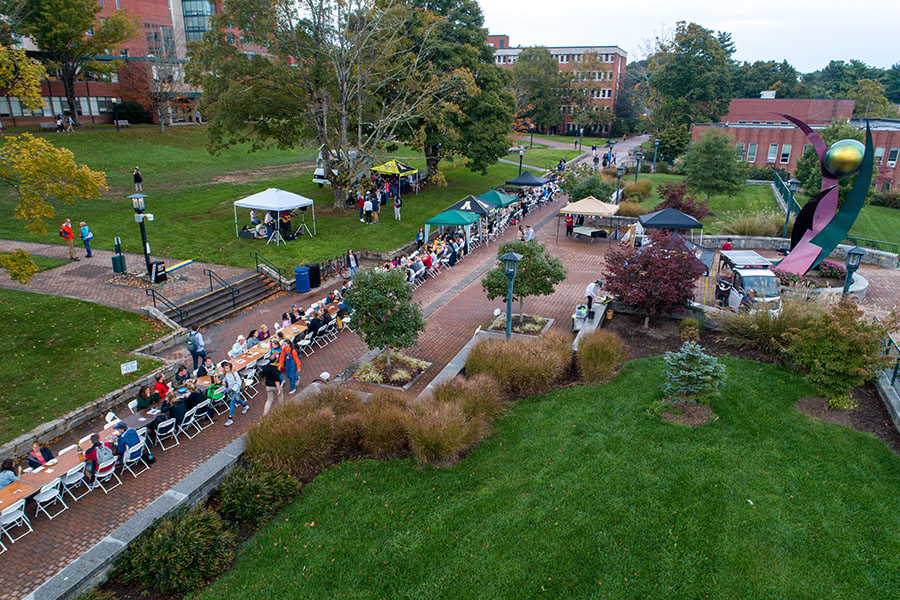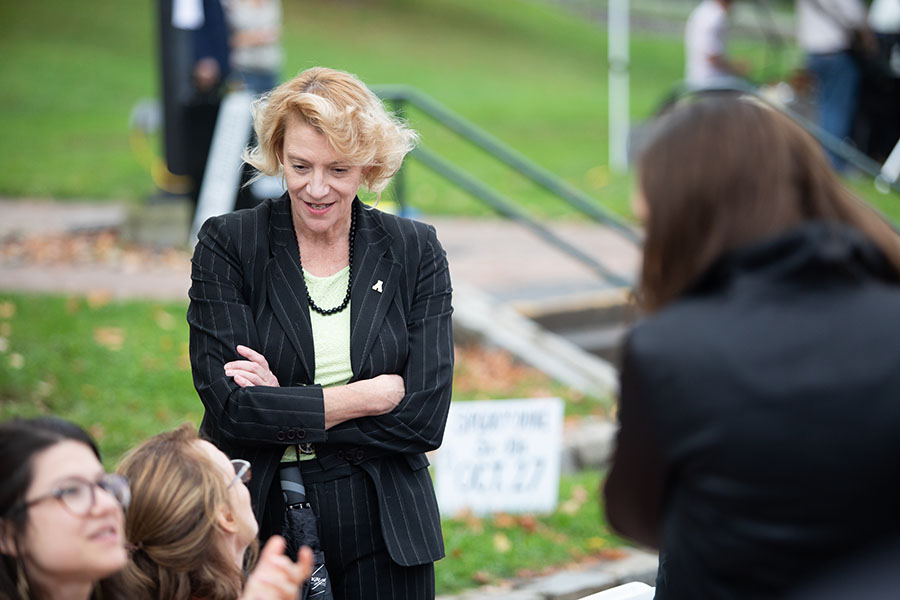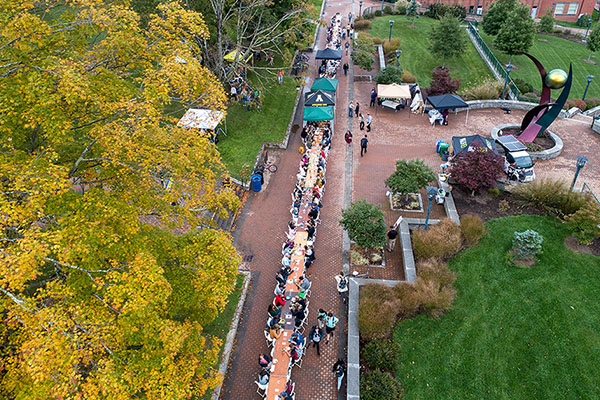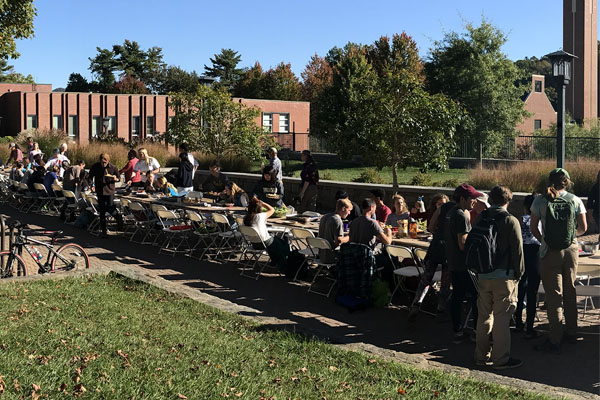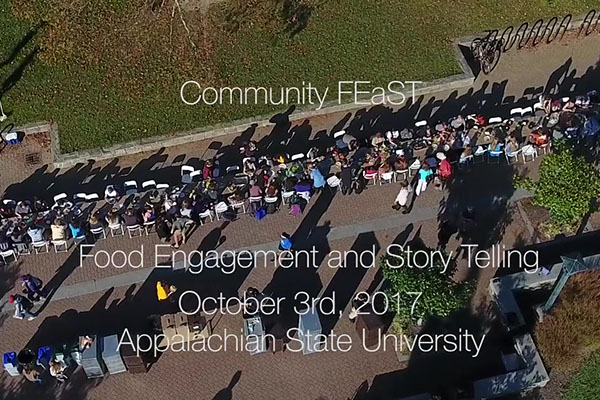BOONE, N.C. — Approximately 300 members of the Appalachian State University Community — including students, faculty, staff and administrators — and the local Boone community came together on Appalachian’s Sanford Mall for an evening of fellowship, food and conversation about the importance of a sustainable food system for all.
The gathering, which took place around a 100-yard continuous table, was part of the university’s second annual Community FEaST (Food Engagement and Storytelling) 2018.
The only “tickets” guests needed to attend? Nondisposable plates, utensils and water bottle.
Appalachian Chancellor Sheri Everts, Provost and Executive Vice Chancellor Darrell Kruger and Vice Chancellor and Chief of Staff Hank Foreman visited the event to be part of the conversation.
Everts thanked both Appalachian’s Food Services and the Office of Sustainability for their efforts in helping with composting for the nearly zero waste event.
The three primary goals of the event, said Carla Ramsdell, senior lecturer in Appalachian’s Department of Physics and Astronomy and a member of the AppalFRESH (Appalachian Food Research for Equity, Sustainability and Health) Collaborative, were the following:
- to build community by encouraging dialogue and storytelling about sustainable food;
- minimize waste; and
- maximize local food sourcing.
“Food transcends cultural differences. We all need to eat, and food has this ability to bring people together,” Ramsdell said. “It breaks down barriers — when people gather around a table of delicious food, the conversation tends to be very productive.”
The AppalFRESH Collaborative, which hosted both the 2017 and 2018 Community FEaST events, consists of Appalachian faculty, staff and graduate students with a common interest in research, education and engagement related to socially, economically and ecologically viable food systems. The group formed in fall 2015.
For the feast, Appalachian’s Food Services provided approximately 300 baked potatoes sourced from North Carolina farms and worked with Blue Ridge Women in Agriculture (BRWIA) to purchase about 150 sweet potatoes for the event through BRWIA’s High Country Food Hub — a weekly online farmers market featuring local goods.
BRWIA is an organization that supports High County farmers and their families with education, resources and skills related to both sustainable food and agriculture.
Dr. Jessica Martell, visiting assistant professor in Appalachian’s Department of English and member of both the BRWIA Board of Directors and AppalFRESH Collaborative, said the Food Hub hosted several tables at the event, providing participants with samples of produce grown locally by Watauga and Ashe county farmers.
She said by offering the locally sourced potatoes, the event’s food miles were lowered — the distance food travels from farm to table — with “more food dollars kept in the High Country economy.”
In addition to the potatoes, Food Services also provided lettuce for salads and apple pie for dessert, as well as basic toppers for the potatoes and salad — including butter, sour cream and cheddar cheese. Local bakery and restaurant Stick Boy Bread Co. also contributed to the feast, supplying 50 French baguettes.
Other toppings, such as chives, chili and peppers, were provided by the 20 campus and community groups — including the Sustainability and Environmental Education Club, English Honors Society, Appalachian Accountants, Public Health Club and others — that hosted tables at the event. These groups also engaged those seated at their tables in discussions on the importance of a sustainable food future.
The event’s tables were topped with handmade vases donated by students in the Appalachian Ceramics Association, which members of Appalachian’s Gardening Club filled with edible greenery from the campus gardens — including sunflowers, narcissus and herbs. Local band Worthless Son-in-Laws performed music that accompanied the sounds of scooted chairs and shuffling plates.
Ramsdell said two new features were part of this year’s Community FEaST:
- community nonprofits that perform work related to sustainable food hosted informational tables, creating a “two-way dialogue,” Ramsdell said, that helps these organizations connect to both community members and students for internships and volunteer opportunities; and
- members of the AppalFRESH Collaborative gathered research data about the 2018 event, Ramsdell said, investigating such questions as, “Does this event really move the needle? Was there a conversation around the table that made participants think of issues about sustainable food that they hadn’t considered in the past?”
Dr. Adam Hege, assistant professor in Appalachian’s public health program in the Department of Health and Exercise Science, said he became involved in the AppalFRESH Collaborative and with organizing the Community FEaST events because of his interest and research in food security issues and health issues related to poverty.
“It bothers me, as a researcher and a public health person, when people are struggling to decide where their next meal comes from,” he said. “That’s what drives me. That’s what really inspires me.”
Hege and other researchers in Appalachian’s Department of Nutrition and Health Care Management have been studying food insecurity on campus since 2014.
He said this issue isn’t unique to Appalachian — students and others in colleges and universities across the nation suffer from food insecurity. Additionally, Hege said, one in five people in Watauga County identify as being food insecure.
According to Hege, the true figures of food insecurity in the High Country may be higher than those reported. “People don’t want to admit that they have a problem, or that they need help and assistance,” he said, “and that’s just part of the resilience that’s in a rural culture.”
More recently, a similar study on food insecurity and homelessness was conducted by Dr. Jeffrey Bortz, professor of history at Appalachian, and two of his former students. This survey in the 2017–18 academic year showed that more than half — 62 percent — of Appalachian students experienced some aspect of food insecurity. Additionally, somewhat severe food insecurity affected one-fifth of students.
The Community FEaST 2018 event was a multidisciplinary collaborative effort of numerous colleges and offices across the university, including the College of Arts and Sciences, Office of Sustainability, College of Fine and Applied Arts, Walker College of Business, Beaver College of Health Sciences, Research Institute for Environment, Energy, and Economics (RIEEE) and more, Ramsdell said.
Waste from the event — most of which was either recycled or composted — was managed by the Office of Sustainability in partnership with the Physical Plant. The meal yielded only three pounds of waste destined for the landfill, with a total waste diversion rate of 91 percent.
The Appalachian Community pulls together to address food insecurity in the High Country
About Sustainability and Energy Management at App State
Appalachian State University’s leadership in sustainability is known nationally. The university’s holistic, three-branched approach considers sustainability economically, environmentally and equitably in relationship to the planet’s co-inhabitants. The university is an active steward of the state’s interconnected financial, cultural and natural resources and challenges students and others think critically and creatively about sustainability and what it means from the smallest individual action to the most broad-based applications. The university offers both undergraduate and graduate academic degree programs that focus on sustainability. In addition, 100 percent of Appalachian’s academic departments offer at least one sustainability course or course that includes sustainability, and all students graduate from programs that have adopted at least one sustainability learning outcome. Learn more at https://appstate.edu/sustainability.
About the Research Institute for Environment, Energy and Economics
Since 2008, Appalachian State University’s Research Institute for Environment, Energy and Economics (RIEEE) has fostered interdisciplinary research on the environment, energy and economics, especially the areas in which these subjects intersect. The institute serves as an umbrella organization for three research centers: the Appalachian Energy Center, Center for Economic Research and Policy Analysis, and Southern Appalachian Environmental Research and Education Center. Additionally, the institute manages and supports App State’s student-led solar vehicle team, Team Sunergy — an exemplary model of the integrative and experiential student learning, leadership and innovation opportunities the institute seeks to foster at App State. Learn more at https://rieee.appstate.edu.
About the College of Arts and Sciences
The College of Arts and Sciences (CAS) at Appalachian State University is home to 17 academic departments, two centers and one residential college. These units span the humanities and the social, mathematical and natural sciences. CAS aims to develop a distinctive identity built upon our university's strengths, traditions and locations. The college’s values lie not only in service to the university and local community, but through inspiring, training, educating and sustaining the development of its students as global citizens. More than 6,800 student majors are enrolled in the college. As the college is also largely responsible for implementing App State’s general education curriculum, it is heavily involved in the education of all students at the university, including those pursuing majors in other colleges. Learn more at https://cas.appstate.edu.
About the Walker College of Business
The Walker College of Business at Appalachian State University delivers transformational educational experiences that prepare and inspire students to be ethical, innovative and engaged business leaders who positively impact their communities, both locally and globally. The college places emphasis on international experiences, sustainable business practices, entrepreneurial programs and real-world applications with industry. Enrolling nearly 5,000 students, including more than 4,500 undergraduates across 11 majors, the Walker College of Business has the highest full-time undergraduate enrollment in the University of North Carolina System. App State’s Walker College is accredited by AACSB International — the premier global accrediting body for business schools. Learn more at https://business.appstate.edu.
About the Beaver College of Health Sciences
Appalachian State University’s Beaver College of Health Sciences (BCHS), opened in 2010, is transforming the health and quality of life for the communities it serves through interprofessional collaboration and innovation in teaching, scholarship, service and clinical outreach. The college enrolls more than 3,600 students and offers 10 undergraduate degree programs, nine graduate degree programs and four certificates across seven departments: Kinesiology, Nursing, Nutrition and Health Care Management, Public Health, Recreation Management and Physical Education, Rehabilitation Sciences, and Social Work. The college’s academic programs are located in the Holmes Convocation Center on App State’s main campus and the Levine Hall of Health Sciences, a state-of-the-art, 203,000-square-foot facility that is the cornerstone of Boone’s Wellness District. In addition, the college supports the Appalachian Institute for Health and Wellness and has collaborative partnerships with the Wake Forest University School of Medicine’s Physician Assistant Program, UNC Health Appalachian and numerous other health agencies. Learn more at https://healthsciences.appstate.edu.
About the College of Fine and Applied Arts
Appalachian State University’s College of Fine and Applied Arts is a dynamic and innovative group of seven academic departments, bringing together a variety of perspectives, experiences and real-world education to provide unique opportunities for student success. The college has more than 3,500 undergraduate and graduate majors. Its departments are Applied Design, Art, Communication, Military Science and Leadership, Sustainable Development, Sustainable Technology and the Built Environment, and Theatre and Dance. Learn more at https://cfaa.appstate.edu.
About Appalachian State University
As a premier public institution, Appalachian State University prepares students to lead purposeful lives. App State is one of 17 campuses in the University of North Carolina System, with a national reputation for innovative teaching and opening access to a high-quality, cost-effective education. The university enrolls more than 21,000 students, has a low student-to-faculty ratio and offers more than 150 undergraduate and 80 graduate majors at its Boone and Hickory campuses and through App State Online. Learn more at https://www.appstate.edu.
What do you think?
Share your feedback on this story.

